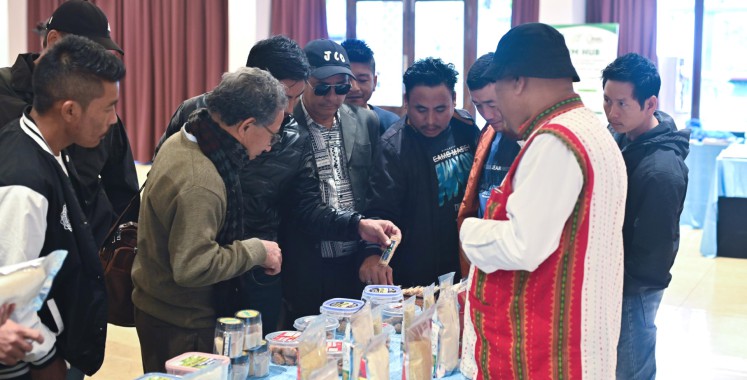




















Wednesday, Nov 06, 2024 23:45 [IST]
Last Update: Tuesday, Nov 05, 2024 18:08 [IST]
GANGTOK, :
An event to promote millet production and to generate awareness on its benefits
was organised by North-Eastern Regional Agricultural Marketing Corporation
(NERAMAC), a Central public sector enterprise under the Ministry of Development
of North Eastern Region (MDoNER), at Gangtok today.
NERAMAC
has previously conducted similar programmes across various Northeastern States
to boost millet awareness and production.
The
event was attended by State Agriculture principal director Rajen Thapa as the
chief guest, Horticulture director Bhim Lal Dahal, NERAMAC managing director
Commodore Rajiv Ashok (Retd.), and NABARD Sikkim assistant general manager
Tempa C. Bhutia.
Addressing
the programme, Commodore Rajiv Ashok highlighted millet as a super food with
significant health benefits. He informed that the Government of India declared
2018 as the “Year of Millets” to promote awareness of the crop’s nutritional
value.
In
2023, millet was designated as an international super food, spurring a rise in
production and global demand, though domestic consumption remains a challenge
due to ingrained dietary habits.
Commodore
Ashok encouraged farmers in Sikkim to expand millet cultivation, leveraging the
State’s status as India’s first organic State to market high-quality organic
millet both nationally and internationally. He infomred that NERAMAC currently
collaborates with 220 Farmer Producer Organizations (FPOs) in its efforts to
promote millet.
Principal
director Rajen Thapa emphasized millet’s nutritional benefits, particularly for
reducing lifestyle diseases such as diabetes and iron deficiency. He
acknowledged the difficulty in shifting dietary habits but urged residents to
gradually incorporate millet into their diets. According to Thapa, millet
cultivation is labour-efficient and requires significantly less water compared
to paddy. He urged local farmers to transform Sikkim's barren lands into
productive millet fields to capitalize on the demand for organic produce.
Thapa
informed that Sikkim currently cultivates millet on approximately 2,000
hectares, amounting to only 2-3% of the State’s arable land. He encouraged the
State’s 58 FPOs to work together to expand millet production, branding and
sales to meet growing national and global demand. He also highlighted the
government’s support through seed distribution and buy-back schemes for quality
crops to motivate farmers.
The
programme also had stalls showcasing a variety of millet-based products from
entrepreneurs in Sikkim, Assam and other NE States.
